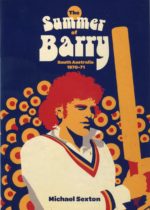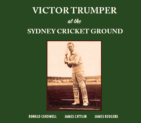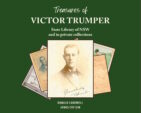The Summer of Barry
Archie Mac |Published: 2020
Pages: 48
Author: Sexton, Michael
Publisher: www.sportswords.com.au
Rating: 3.5 stars

When I reviewed Michael Sexton’s Chappelli’s Last Stand in 2017, I wrote that if any other books released on Australian domestic cricket were half as good, I would eagerly read them all. Well apart from a magnificent book about an Aussie Rules champion, which I can’t review on CW, I think this is the only other book by Sexton on domestic cricket. While The Summer of Barry, is not quite at the level of Chappelli’s Last Stand – it’s still an enjoyable read albeit I did notice one or two typos, which is surprising in such a short read.
Sexton has a great ability to know what to include and leave out of a book, which makes it the more enjoyable, as there is no temptation for the reader to drift off. In The Summer of Barry he starts with some context, and that is the cancelling of England’s proposed tour to South Africa in 1968/69. At this stage Barry Richards was yet to play Test cricket and although he rectified that in 1970 against the Australian team, the four Tests he played in that series would be the sum total in his career.
South Africa were set to tour Australia in the 1971/72 summer, so Barry Richards took up an offer to play grade cricket in and for South Australia, to in part gain some experience of Australian conditions. In the end the season truly belonged to Richards who destroyed every opposition team he played against, including scoring 300+ in one day against a Western Australia team which contained a young Dennis Lillee.
Sexton provides an account of all the first class matches in which Richards takes part, and also builds up tension as South Australia try to win the Sheffield Shield. The battle for the Shield comes down to the last round of fixtures with four states still in the running for the title. There are also brief – one page – accounts of the longest Test series in cricket history, between England and Australia. Due to weather and the inaugural first Test in Perth, the Ashes ended up being contested over seven Tests.
Sexton draws out some interesting observations about the season from Richards. His view, which only someone with rare talent could have, were that after he made a century it was his job to entertain the crowd and if still not out, he would then try and entertain himself by taking more and more outlandish risks. This was in stark contrast to Geoffrey Boycott, who was on tour with the English team. Boycs just kept batting and batting at one monotonous pace. In one game against South Australia, Boycott batted sedately for the entire first day, and upon leaving the field went straight into the nets for even more practice. He also had a net the following day before being dismissed without adding to his overnight score.
Barry Richards was certainly a professional cricketer. He played professionally for Hampshire in England and during his summer in Australia he received one dollar for each run he scored. To say he cashed in would be an understatement. Unfortunately for Richards the South African tour for 1971/72 was cancelled and replaced by a World XI – for which Richards was not selected. At least this solved the question that had been asked throughout his season in Australia. How were the Australians ever going to dismiss Barry Richards if he had another Summer of Barry?
I am now an unabashed Sexton fan and if you read his latest cricket book, then I am sure you will become one too.






Leave a comment